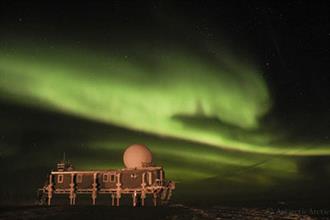Wilderness Medicine Programs Goes to Greenland
By Chris Casey
 (May 2016) The University of Colorado School of Medicine’s Department of Emergency Medicine is taking its expertise in austere medical care to one of the most extreme and remote places on Earth: Summit Station, a global research facility perched at 10,500 feet atop the Greenland ice sheet.
(May 2016) The University of Colorado School of Medicine’s Department of Emergency Medicine is taking its expertise in austere medical care to one of the most extreme and remote places on Earth: Summit Station, a global research facility perched at 10,500 feet atop the Greenland ice sheet.
In December, the department’s Wilderness and Environmental Section (WEM) won a subcontract grant from the U.S. National Science Foundation to provide field health care services at Summit Station.
Jay Lemery, MD, associate professor of emergency medicine and section chief of WEM, says providing medical services at Summit Station allows WEM to “think outside the box” in an unpredictable environment.
“It’s basically the art and science of taking care of people in remote and extreme environments,” he says. “It forces us to think in very creative ways. How do we take
WEM honed its expertise in remote medical services by holding the EMS medical directorship for the U.S. Antarctic Program for two years. In Greenland, the CU WEM bid was selected over other applicants, including from private industry, for the subcontract, which lasts for a year with an option for renewal. WEM will work with CH2M Hill, the prime contractor, and Polar Field Services, a subcontractor providing science support and field operations.
Four services for Summit Station
In Greenland, WEM will be in charge of four phases of service:
- Remote medical support services and supplies for Summit Station;
- 24/7 telemedicine services;
- First aid medical support services; and
- Training in arctic first aid and wilderness first responder/aid.
Lemery notes that people are more frequently venturing to extreme places across the globe, and the expertise of WEM faculty – in altitude sickness, frostbite, hypothermia, trauma treatment
“We have that niche in the health-care world,” Lemery says. “Greenland is a robust place to test best practices in medicine – to see what works, what doesn’t work. We’re also training people to be outstanding clinicians anywhere in the world. Most of the planet doesn’t have the medical tools
David Twillman, RN, University of Colorado Hospital, will staff Summit Station during the high season of roughly April to August. During the winter months, WEM will provide medical services via telemedicine.
‘Quite a bit of altitude sickness’
Christopher Davis, MD, assistant professor of emergency medicine, led WEM’s application for the Greenland subcontract and will serve as medical director for the operation. He says adjusting to high altitude is the most common health complaint of the researchers, who spend weeks to months at a time at Summit Station. “Most researchers are coming from sea level and they fly directly to 11,000 feet,” he says, “so you see quite a bit of altitude illness.”
Davis, who is also medical director of Altitude and Mountain Medicine Consultants, a branch of the Travel, Expedition and Altitude Medicine Clinic, plans to visit the Summit Station this spring to ensure that the medical equipment is up to date. During the summer high season, about 50 researchers live and work at the station. In the winter, fewer than 10 people live at the facility, Davis says. Much of the research conducted at the facility focuses on climate and weather.
Greenland’s polar environment and growing medical needs made Summit Station a perfect fit for WEM’s service-oriented approach to health care.
“Our department chair, Richard Zane, MD, has been very supportive of us being entrepreneurial and extending the reach of our medical expertise to far afield,” Davis says. “This is also in line with the university’s research mandate.”
Although no specific CU School of Medicine Greenland-based research has yet been approved, Davis says, “there will be the opportunity for us to study altitude and also study health care systems and how and whether telemedicine support is effective in this type of extreme environment.”
Unprecedented course
Another opportunity that Summit Station provides: Teaching an unprecedented course in one of the most dramatic locations on the planet. Lemery and Davis together will teach “Introduction to Polar Medicine” over a week in August in the town of Ilulissat, Greenland. Students will receive three hours of credit for the accredited course, as well as a Wilderness First Aid certificate.
“We’ll talk about climate change and health and provide wilderness medicine education,” says Lemery, who co-edited the book Global Climate Change and Human Health. “It’s pretty unorthodox – nobody’s really done anything else like this. We think it’s going to be an awesome opportunity for students.”